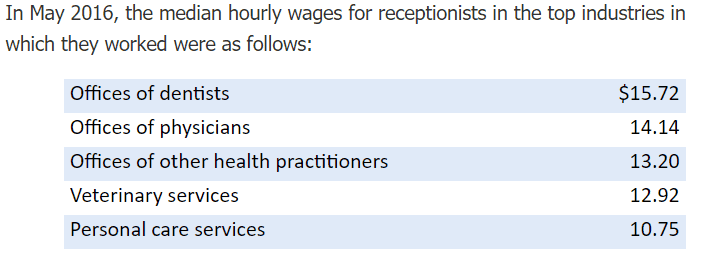Are you considering hiring a receptionist? Not sure if you’re ready to commit to another full time employee? Why is a receptionist important, after all? Read below for a full understanding of what a receptionist does, the importance of a receptionist in your company, and some alternatives to a traditional receptionist.
Don't have time to read now?
Download a PDF copy to read later.
This article is over 1200 words, packed full of information about receptionists.
Download a copy to read later, and you can come back to it over and over again.

![]()
Receptionist Definition
According to Merriam Webster, a receptionist is a person employed to greet telephone callers, visitors, patients or clients.
But receptionists are much more than greeters. They have many different duties and work in many different industries.
What is a Receptionist?
A receptionist is the first point of contact that anyone has when reaching out to your company. The face of the company, if you will. So, you’ll want to make sure that person represents your company well. Why is a receptionist important? Because the first impression that potential clients, customers, employees or partners have with your business can be its success or downfall. That’s why we recognize the huge value that a receptionist has.
But, what do they do?
Receptionist Job Description
Receptionist duties
Duties for a receptionist vary from place to place. Some of the duties you’ll assume to take on as a receptionist are the following:
- Welcome guests
- Connecting guests to appropriate staff
- Create a positive and memorable experience for customers, clients, patients, partners, employees, investors–anyone that walks in or calls your place of business!
- Answer, screen, and forward phone calls
- Schedule and confirm appointments, meetings and travel appointments
- Maintain calendars
- Take messages
- Accept mail and courier deliveries
- Increases security by determining who get access to the office
- Inform employees of visitors’ arrivals or cancellations
- Complete paperwork, enter customer data, file paperwork
- Send correspondence via email, fax, text message, or mail
- Copy, file, and maintain paper or electronic documents
- Accept payments, depending on the industry
Who can be a Receptionist?
Generally, the education requirement to become a receptionist is a high school or equivalent education. Many places of business prefer but do not require experience as a receptionist prior to hiring. An understanding of word processing, spreadsheet applications, and the various technology likely to be used for the specific industry is definitely a plus when employers are looking for a new receptionist. So is a professional attitude, friendly demeanor, and ability to answer the phone professionally.
Soft skills are very important in a receptionist. They should be organized, speak and write clearly, manage time efficiently, be courteous, and have integrity. A great receptionist will be an active listener and will always come off as a professional.
Usually a new hire will receive office-specific, short term on-the-job training. Much will be learned as they go along. If in a medical industry, they will learn about privacy laws. Each office is different and training will vary from place to place.
Average Salary
According to the U.S. Department of Labor Statistics, the median hourly wage for receptionists was $13.42 in May 2016, or about $27,920 per year. Though, the can vary greatly from place to place, depending on the industry that you are working in, amount of years worked for the company, and the various duties one fulfills. The lowest paid industry that a receptionist works in, generally, is the personal care industry (hair and spa services, for example) and the highest is generally at a dentist office. The pay is above twenty dollars an hour to top ten percent of earners in the field.
Job Outlook
Looking good! Receptionist job prospects are growing and growing. It’s estimated that overall, receptionist jobs will continue to grow 10% from 2014 to 2024. The health care industry is growing and is especially seeing an influx in need for receptionist services.
However, other industries are not expecting the same growth. They have turned to more automated processes. More on that later.
Work Environment
As mentioned before, the variety of industries in which you’ll find receptionist jobs calls for big differences from one position to another. Generally, receptionists will be at a desk that is well lit, highly visible, and very quiet. Most is in a comfortable office setting.
Unfortunately, there are downsides to working as a receptionist. It may be tiring, repetitive and stressful continuing to man a busy office day in and day out. Some callers may be difficult and rude.
Still Wondering ‘Why is a Receptionist Important?’ Here’s what else a Receptionist might do
As if all of those things weren’t enough! Oftentimes, a receptionist ends up fulfilling the role of customer service representative. Why? Because when a person is upset, confused, or angry, they’re willing to unleash on the first person they come in contact with. They must remember to avoid certain phrases and learn to deal with irate people.
All in all, a receptionist can be your office’s resident Jack-of-all-trades. In an office that isn’t receiving frequent calls and visitors, the receptionist is able to get involved with all aspects of the business while others stick to their department. They are flexible and have a high awareness of the goings-on throughout the business. They are very knowledgeable about the company for this reason. This makes a receptionist the ideal person for customers to go to with questions.
Some offices require their receptionist to be their first line of contact when it comes to technology woes. Because they have so much familiarity with the company, they know how the technology works. At other offices, the secretary is responsible for maintaining and updating website information and social media updates.
The New Receptionist
Tech startups aren’t just putting out new apps for your phone. They’re also leading the way in changing how small companies do business. They don’t want potential investors to see a receptionist at the front desk and worry that capital is being spent frivolously on extra employees.
They want their startup to run as smoothly as the technology they are selling. They’re in tech: known for wearing jeans to work and a more lighthearted approach to business. That’s why they take a more personal approach.
There are several ways in which these businesses are changing how things are done. Some have an open office so that they can be greeted immediately by the employees. Others have a phone system outside of the office door, so that they may directly come in contact with the employee they are coming to visit. There’s even a robot receptionist being sold! Even a simple visitor management app takes care of in-person visitors.
What about phone calls?
Those options sound really great for manning the door. But, what about the phones?! Someone still has to do the call screening. There are still times in which the business owner will be out of office. In each case, these companies have hired a virtual receptionist. Virtual receptionists are available twenty four hours, seven days a week, and can even take callers on holidays. Sure, they aren’t in-office to file your paperwork. If you’re using technology and outsourcing to optimize your time, you won’t need anyone to do that, anyhow!
Virtual receptionists can be the voice of your company, even when there isn’t a face at the front desk.
Apply this to your small business
Receptionists fulfill many roles in an office. But, some small business owners are looking to cut costs and only have specific needs to be met. If you’re one of them, there are alternatives to a traditional full-time employee at the front desk of your office.
Now, give these a try:
- Find out your specific needs
- Determine what solution makes the most sense for your business
- Contact an answering service that has been delighting clients for over 50 years








[…] Article: https://apolloansweringservice.com/why-is-a-receptionist-important/ Categories: […]
[…] providers of serviced offices have professional, well-trained staff to meet all your needs. A receptionist is always on-site, to answer the phones, take messages or forward calls to a number of your choosing. They will also […]
Very insightful blog! Thanks for sharing helpful information.
Happy to help!
What is your biggest challenge related to the receptionist?
[…] These first impressions your business has with potential clients, customers, employees, and partners play a critical role in business success. […]